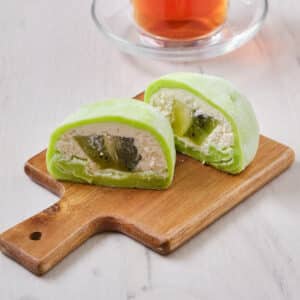If you've ever made deviled eggs, then you know that it's not a hard dish to make, but it can be time-consuming. And if you're like me, sometimes you might end up with more deviled eggs than you can eat in one sitting.
So what do you do with the leftovers? It's up to you if you want to eat them all (not judging), or you can freeze them for later. Check out this extensive guide on how to freeze deviled eggs and useful tips so you can enjoy them anytime!
Jump to:
Why do you love deviled eggs?
Deviled eggs are one of my all-time favorite foods. I love the creamy filling, the tangy flavor, and the ease of making them ahead of time. Deviled eggs are also incredibly versatile. You can add different ingredients to the filling, from bacon to smoked salmon to goat cheese. Plus, they're always a hit with guests! And they're perfect for any occasion, from a casual picnic to a formal dinner party.
Whether you're looking for a simple appetizer or a show-stopping dish, deviled eggs are always a good choice. So, give them a try next time you're in the mood for something special! There's no doubt you'll become a fan. You can find the recipe for deviled eggs here.

Can you freeze deviled eggs?
You can freeze the yolk filling of deviled eggs in a sense, but not the whites. Why is that? It's all about texture. The whites of the eggs will become rubbery when frozen, making them unpalatable. It has to do with the proteins in the egg whites. When frozen, the proteins tighten up and squeeze out moisture, resulting in that rubbery texture. However, the yolk filling will retain its smooth and creamy texture.
Among such ingredients are cooked egg whites: EatingWell recommends that you don't freeze them if you want them to retain their shape. Whether the egg is intact or not, once the whites are at room temperature, they take on a rubbery, watery consistency. A recent article in Healthline reiterates this point, highlighting that you should avoid freezing whole eggs, whether they are hard-boiled or soft-boiled.
Read:
How to freeze the yolk filling of deviled eggs?
You'll inevitably have some leftover yolk filling after making deviled eggs. But don't worry, because you can freeze it for later! Follow these simple steps to ensure your yolk filling stays fresh and delicious.
Step 1 Spoon the yolk filling into a freezer bag or container.
Spoon the yolk filling into a heavy-duty Ziploc bag or freezer-safe container, leaving enough room at the top to expand. As the yolk filling freezes, it expands; if there's no room for expansion, the bag or container will burst, and no one wants a mess in their freezer. Plus, it makes it easier to portion out when you're ready to use it again.
Step 2 Flatten the bag or cover the container tightly with plastic wrap or a lid.
#1 If using a Ziploc bag:
To prevent the yolk filling from clumping together, flatten it out in the bag or container before sealing. Lay the bag flat on a sheet pan or cutting board and freeze until solid. This will help the yolk filling freeze in a single layer so you can easily break off what you need later.
Once the yolk filling is frozen solid, arrange the bagged or containerized deviled eggs in the freezer so they will take up less space. Then, you can grab just a few at a time as you need them.
Flattening the yolk filling makes scooping it out much easier when you thaw and use the frozen deviled eggs. If you don't flatten it before freezing, the yolk filling will likely freeze into one big clump.
#2 If using an airtight container:
Sealing the container tightly so the yolk filling doesn't absorb any smells from your freezer will help prevent freezer burn and keep your yolk filling tasting fresh. Also, leave some room at the top of the container, as the filling will expand when frozen.
Step 3 Label the container with the date and contents.
To ensure the best quality of your frozen yolk filling, consume it within two months. Remember to label the bag or container with the date so you know how long it's been in the freezer and can eat them before they go bad. Labeling the container also helps if you have multiple containers of frozen yolk filling in your freezer.
Step 4 Freeze the yolk filling for up to 2 months.
When properly stored, frozen yolk filling will stay fresh for up to 3 months. After that, it may start to lose its flavor and texture. So if you won't be using it within 2 months, it's best to throw it out. When ready to use it, thaw it in the refrigerator overnight and use it as a fresh yolk filling.
Step 5 Thaw in the fridge overnight
Easy peasy! When ready to use the frozen yolk filling, thaw them overnight in the refrigerator. Once melted, the yolk filling can be scooped out or piped the filling into the egg whites and used as usual.
How to defrost deviled eggs?
You're in luck if you've got a batch of deviled eggs you need to thaw or defrost. Check out this guide on how to do it quickly and easily. You'll be able to enjoy your delicious eggs without worrying about them going bad!
There are two ways to defrost or thaw deviled eggs: in the refrigerator or in cold water.
Method 1 In the fridge
The best way to thaw deviled eggs is in the refrigerator overnight. Doing this will prevent the yolk mixture from becoming water-logged, and you will retain the mixture's flavor.
To thaw deviled eggs in the refrigerator:
Step 1. Place the eggs on a plate or in a container lined with paper towels.
Step 2. Put them in the fridge and let them thaw overnight.
Step 3. After thawing, take them out of the paper towels.
Step 4. Pipe the yolk fillings into the egg halves and enjoy!
Method 2 In cold water
The second way to defrost deviled eggs is by submerging them in cold water. This method is a bit quicker than the refrigerator method, but it's essential to keep an eye on the eggs so they don't over-defrost.
To thaw deviled eggs in cold water:
Step 1: Fill a bowl with cold water and ice cubes.
Step 2: Submerge the bag of frozen yolk fillings in the cold water and let them sit for 20 to 30 minutes. Avoid using warm water because it accelerates the growth of harmful bacteria.
Step 3: Remove the bag of yolk filling from the water and wipe it dry with paper towels, as you don't want water to get into the yolk mixture when you're thawing it out.
Step 4: Put the frozen yolk filling in a bowl and let it sit at room temperature for 10 minutes. It will help the mixture to thaw further.
Step 5: Once the yolks are thawed, fill the egg halves with the yolk mixture and enjoy!
Note:
Whichever method you choose, eat the eggs within 24 hours of defrosting them. After that, they may not be as fresh and delicious as you'd like. So get thawing and enjoy your deviled eggs!
How long will yolk filling for deviled eggs keep in the freezer?
It is important to note that the yolk filling will only last for a while in the freezer. Remember that the quality will decline after two months. The filling will change in texture and flavor as it freezes. If you want to enjoy the yolk filling at its best, it is best to consume it within two months of freezing. After that, the quality will decline, but it will still be safe to eat.
When freezing yolk filling, it is vital to avoid freezer burn. It can happen when the food is not properly sealed or wrapped, allowing air to reach the food and dry it out. The yolk filling can also become freezer-burned if stored for too long.
To avoid freezer burn:
- Wrap the yolk filling tightly in plastic or aluminum foil.
- Make sure there is no air exposure to the yolk filling.
- Putting the yolk filling in a freezer bag with all the air squeezed out is best.
Read:
What is the best way to store deviled eggs in the refrigerator?
When making deviled eggs, you can follow the below steps to prevent the crusty top from forming. Why is crust forming on top? Because the egg yolks will oxidize and turn brown when exposed to air.
To prevent this from happening, you can:
1 Cover the deviled eggs with plastic wrap.
Make sure that the plastic wrap touches the surface of the egg yolks so that there is no air exposure. The oxygen in the air will cause the egg yolks to oxidize and turn brown. By touching the surface of the egg yolks with the plastic wrap, you are creating a barrier between the air and the egg yolks.
2 Place the covered deviled eggs in a container with an airtight lid.
Having an airtight lid prevents oxygen from entering the container and coming into contact with the egg yolks. Also, make sure to place the container in the refrigerator as soon as you are done making the deviled eggs. The cold temperature will help slow down the oxidation process.
3 Eat the deviled eggs within 2-3 days.
The sooner you eat them, the fresher they will be. Three days is the maximum time to store deviled eggs in the fridge. The egg yolks are high in fat and moisture. When stored in the refrigerator, the egg yolks will lose moisture and fat, causing them to become dry and crumbly.
4 Let them sit at room temperature before serving.
When you are ready to eat the deviled eggs, remove them from the refrigerator and let them sit at room temperature for at least 30 minutes before serving. Allowing the deviled eggs to sit at room temperature allows the moisture in the egg yolks to redistribute, which prevents them from drying out. This is especially important when using a mayonnaise-based filling, as it can cause the eggs to dry out more quickly.
Note:
Keeping eggs at room temperature increases their perishability. A short period can be enough for them to enter the danger zone for bacteria growth, so remember to refrigerate them as soon as possible. When you remove the deviled eggs from the fridge, eat them within 2 hours.
Can you serve deviled eggs chilled?
Yes, you can serve deviled eggs chilled. Many people prefer to eat them chilled or at room temperature. Eat them within two hours if you serve them at room temperature. The eggs will stay fresh and won't spoil if you do this.
How long will deviled eggs keep in the fridge?
Deviled eggs will keep in the fridge for up to 3 days. Do you know why? It has to do with the makeup of the egg. The egg white is mostly water, while the yolk is made up of protein and fat. Bacteria grow more readily in yolks than in whites, so the yolks have a higher risk of bacterial growth. Thus, it's crucial to refrigerate deviled eggs, so the egg yolks don't spoil.
Additionally, it is due to the high acidity of the filling's vinegar, lemon juice, and mayonnaise. Furthermore, this inhibits the growth of bacteria.
So, if you have leftover deviled eggs, store them in the fridge and eat them within 3 days. After that, they are not safe to eat. When keeping deviled eggs, you can place them in an airtight container to prevent the egg yolks from drying out and becoming crumbly. Also, refrigerate the deviled eggs as soon as possible after making them.
If you want to extend your deviled eggs' shelf life, you can freeze them. Freezing deviled eggs is a great way to enjoy them later on, and it doesn't take much effort. Check out the above guide on how to freeze deviled eggs so you can enjoy them anytime!
What is the best way to transport deviled eggs?
If you bring deviled eggs to a potluck or picnic, you must transport them safely. The best way to transport deviled eggs is in a cooler with ice packs. This will keep the eggs cold and prevent them from becoming unsafe to eat. Make sure to keep the deviled eggs in their original container or use a portable deviled egg container with a lid so they don't get squished.
If you don't have a cooler, place the deviled eggs in a covered dish or egg container with a lid and place them in the fridge until it's time to leave. Once ready, put the dish in an insulated bag or box to help keep the eggs cold during transport.
If you're eating the deviled eggs within a few hours of making them, you can store them in the fridge. Keeping them longer than that requires freezing.
How to keep the deviled eggs fresh?
Keeping deviled eggs fresh after cooking can be tricky. If you are not eating them immediately, you must store them in the refrigerator. But before you put them in the fridge, there are a few things you can do to extend their shelf life.
1 Separate the boiled egg whites and yolk filling
Keep the yolk filling and egg whites in the refrigerator separately, then fill your deviled eggs when ready to serve. The yolk filling can dry out in the fridge, so separating it from the egg whites will help it last longer. According to USDA, you can store cooked egg halves in the fridge for up to seven days.
2 Use an airtight container and wrap the egg whites in plastic.
The advantage of individually wrapping the egg whites is that it helps to keep them from drying out. This step is unnecessary if you plan on using the egg whites within a day or two.
3 Place the yolk filling in a Ziploc bag.
Storing the yolk filling in a Ziploc bag helps to keep it fresh and prevents it from drying out. This will help to keep them from absorbing other flavors and odors in the fridge. This way, you can enjoy your deviled eggs later without worrying about the filling being too dry or crumbly.
Plus, it's just one less thing to worry about when preparing your eggs for freezing.
4 Cut a small hole in the corner of the Ziploc bag and pipe the yolk filling into the egg halves.
Snipping off a small hole in the corner of the Ziploc bag allows you to control the amount of yolk filling piped into the egg halves. If you don't cut a hole in the bag, the filling may come out too quickly and make a mess. Plus, it's easier to pipe the filling into the eggs when the hole is already there.
Extra tip:
If you want to keep deviled eggs at a consistent temperature, store them in the fridge. Alternatively, if you prefer to prepare the deviled eggs in advance, you can store them in an airtight container with a lid in a single layer and wait to garnish them until you are ready to serve.
You might be interested in investing in these egg containers featuring egg slots and vents to keep them fresh for longer. When ready to serve, take the deviled eggs out of the fridge and let them come to room temperature. Adding this step will help the flavors to blend together and make them more enjoyable.
How long can deviled eggs sit out?
Deviled eggs are a delicious and easy appetizer, but you might wonder how long they can sit out. The answer depends on a few factors, such as the room's temperature and whether the eggs have been refrigerated.
Ideally, you should serve deviled eggs within two hours of being made. You should serve them within one hour if it is hot outside or the room is warm. If the eggs have been refrigerated, they can be left out for up to four hours. Since refrigeration slows down bacteria growth, it prevents them from multiplying.
However, it is best to err on caution and leave deviled eggs out for only two hours, especially if they have not been refrigerated. If you need to leave them out for longer, keep them in a cooler with ice packs are best. You should discard eggs sitting out for more than eight hours.
When it comes to food safety, it is always better to err on the side of caution. It is not worth risking food poisoning for a few deviled eggs! If you are unsure how long the deviled eggs have been sitting out, it is best to throw them away.
Are deviled eggs good to eat the next day?
It depends on how you store them; as long as you keep them in the fridge, deviled eggs are perfectly safe to eat the next day. In fact, they may even taste better than they did the day before! Just be sure to store them in an airtight container in the fridge and consume them within 24 hours.
Following USDA recommendations, you should not store hard-boiled eggs for one week at maximum. Deviled eggs, however, will last for 3 to 4 days because of the added ingredients in the yolk mixture.
If you want to extend the shelf life of your deviled eggs, you can freeze them for 2 months. But I recommend freezing the fillings only. Why is that? The egg whites tend to get rubbery when frozen and thawed, which makes for a less-than-ideal texture in your deviled eggs. Therefore, it's best to freeze the yolk mixture and then add it to fresh egg whites when ready to eat them.
Deviled eggs: How can you tell if they're bad?
Deviled eggs that smell sour or unpleasant should be tossed. When in doubt, give them a sniff: An unpleasant, sulfurous smell indicates its time to throw them out.
There are a few things you can check to tell if your deviled eggs have gone bad:
1 Take a look at the color of the yolk.
Why does discoloration indicate spoilage? Because as the egg ages, the yolk breaks down and oxidizes. If it's discolored or greenish, the eggs are probably bad, and you should throw them out.
2 Check for any unusual smells.
If your deviled eggs smell sour, fishy, or ammonia-like, it's best to toss them. These are all signs that the eggs have gone bad and are not safe to eat.
3 Check the texture of the yolk filling.
If it's slimy or gritty, this is another indicator that the eggs have gone bad or if it's lumpy or watery, this is another sign that your deviled eggs have gone bad, and you should toss them.
If your deviled eggs pass the smell and texture test, then congratulations! Your deviled eggs are still good to eat.
4 Check the texture of the egg white.
If it's slimy or looks watery, it's time to throw those eggs out. A healthy egg white will be firm and have a slightly opaque appearance.
5 Smell test the eggs.
The best way to tell if your deviled eggs are still good is to give them a smell test. If they smell sour or funky, it's time to eliminate them. If you're still not sure, err on the side of caution and throw them out.
6 If the eggs are old
Finally, if the eggs are more than a few days old, they're probably not good anymore, so it's best to play it safe and throw them out.
Why can't you freeze boiled egg white halves for deviled eggs?
If you've ever made deviled eggs, you know that they typically call for egg whites that have been boiled and then cooled. A time-saving strategy might be to cook a bunch of egg whites at once and then freeze them later.
Egg whites that have been boiled and then frozen tend to become rubbery and difficult to work with. The texture is unappealing and can ruin the taste of your deviled eggs. However, there are better ideas than this.
It's better only to boil as many egg whites as you need for your recipe and then store them in the fridge until you're ready to use them. That way, you'll always have fresh, delicious, deviled eggs.




